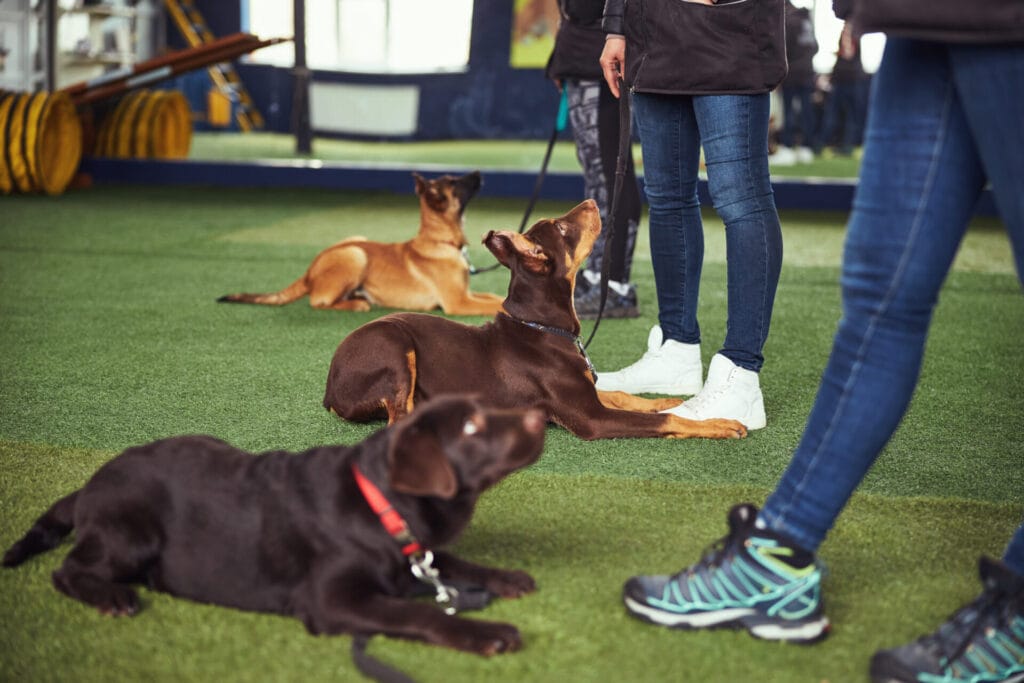Have you always dreamed of becoming a dog trainer? Dog training is a versatile career where you can work with people and their dogs to achieve their goals. To be a successful dog trainer, you must love working with dogs and be skilled and compassionate in communicating with people. Effective communication is crucial because the dog owners are the ones paying for the training classes and attending with their dogs. If you’re considering a career as a dog trainer, here are some key points to keep in mind.
What Dog Trainers Do
A common misconception about dog trainers is that they spend all their time playing with puppies, but dog training involves a lot of work and can be physically demanding. Dog trainers may own their own businesses, teach group or individual classes, work at large training facilities, pet shops, or doggy daycares, or collaborate with rescue groups or shelters. Some dog trainers work in person, while others teach virtual classes or conduct training sessions remotely via video. Each dog trainer’s schedule and approach to work will vary.

Seek Out Mentorship
One of the best ways to learn about dog training and determine if it’s the right career path for you is to work with a mentor. Some dog trainers offer formal apprenticeship systems, providing hands-on experience and education to aspiring trainers. Others may offer more casual mentorship. Mentoring with an experienced dog trainer allows you to see behind the scenes and understand what it’s like to work with dogs in a training capacity. Mentors can also help connect you with other dog professionals in your area. To find a mentor, get involved with dog training events and organizations in your community.
Get Experience
Pursuing your dream of becoming a dog trainer requires hands-on experience. If you have a dog, start by training them and then gain experience working with other dogs. Many dog rescues and shelters seek volunteers to walk dogs and assist with basic training. You can also help friends and family with their dogs. At this stage, finding a mentor is critical, as they can assist you in finding dogs to work with by letting you help in their classes, co-teach, or cover classes when needed. Training programs like the Karen Pryor Academy and the Victoria Stilwell Academy also provide instruction and knowledge in dog behavior.
Get Credentials
Dog training is currently an unregulated industry, so anyone can call themselves a dog trainer. However, there are national professional organizations and certifications available that can demonstrate your commitment to the profession and your skill in using science-based, positive reinforcement techniques. Organizations like The Association of Professional Dog Trainers and The Certification Council for Professional Dog Trainers offer support, guidance, and certification processes for trainers to showcase their expertise.
Decide on a Specialty
As you consider a career in dog training, think about the types of training that interest you. While some trainers do a bit of everything, most specialize based on their skills, experience, and interests. For example, some trainers teach puppy and basic obedience classes, while others focus on dog sports like agility, rally, or scent work. Some specialize in training service dogs or handling behavioral issues such as separation anxiety, reactivity, or aggression. Narrowing down your interests will help you find mentors, gain focused experience, and attract clients.
Continuing Education
The field of dog training and our understanding of dog behavior is constantly evolving. Being a good dog trainer means continually gaining experience and pursuing ongoing education. Many certifications require proof of continued education through seminars and workshops. Attending training conferences, such as the Clicker Expo or the Association of Professional Dog Trainers National Conference, is a great way to learn more about the industry and gain valuable experience. These conferences, which take place in various parts of the United States, also offer virtual options for those who cannot travel.




















